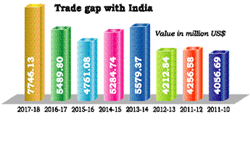Trade gap with India stood at $7746.13m in FY2018

The rising trade deficit with the neighbouring India has become one of the major concerns for the economy of Bangladesh. The diplomatic failure is one of the major reasons behind widening the trade gap with India, they claimed. According to sources, in FY 2017-2018 Bangladesh trade gap with India stood at $7746.13 million.
The trade imbalance has gradually increased mainly higher imports for industry, food grains, essential commodities and so on, they said.
Experts pointed out, the trade gap increased mainly due to higher imports from India. They said India is one of the largest sources of raw materials for Bangladeshi manufacturing industries, which is the reason of high trade gap; contrarily Bangladeshi goods face various non-tariff barriers.
Diplomatic failure is also a reason for the huge trade deficit with the neighbouring India. Even though Bangladeshi apparels enjoy duty-free access, it could not make any significant growth in export mainly because of the non-tariff barriers and government’s lack of initiative in negotiation with the counterpart on different trade-related issues, they pointed out. Former President of the Federation of Bangladesh Chambers of Commerce and Industry (FBCCI) Mir Nasir Hossain told Daily Industry that trade imbalance of Bangladesh with India is increasing because of the rising trend of imports against exports.
“Our imports are increasing mainly from India that comprises various goods including raw materials, food items and capital machineries. At the same time, we could not boost our exports to the neighboring country.”
He said that apart from having a small number of exportable items, the tariff and non-tariff barriers as well as infrastructural problems also impede country’s export to India.
Bangladesh could reduce the trade imbalance with India by boosting exports of garment items, consumer goods, battery, ceramics and melamine, he mentioned.
A senior Bangladesh Bank official said, the trade gap with India continued to rise in recent years as Bangladesh failed to attract the Indian consumers to its products due to lack of product diversification.
Experts said it is a bad sign that the country’s trade deficit with India continued to rise in recent years.
The increasing trend in import from India is not a headache for the business sector but the rising trade gap is a matter of concern, they said.
However, the trade imbalance between India and Bangladesh has increased significantly over the past decade even though Bangladesh’s economy has grown rapidly and its exports to the neighbouring country have risen, said sources in the commerce ministry.
Bangladesh’s trade deficit with India has swelled in recent years with import continuously rising while export hitting rock bottom for barriers created on the neighbouring market.
According to sources, in 2017-2018 fiscal year Bangladesh imported $8,619.40 billion goods from India. At the same time Bangladesh exported to India only $873.27 million items, according to Export Promotion Bureau report. The trade gap between these countries increased to $7.75 billion.
The data also showed that Bangladesh’s trade imbalance with India stood at $5.45 million in FY 2016-17, $4.76 million in FY 2015-16, $5.30 million in FY 2014-15, $5.58 million in 2013-14, $4.21 million in 2012-13, $4.25 million in 2011-12 and $4.05 million in fiscal 2010-11.
Political commentators wishing not to disclose their identity said relation between two neighboring countries has been very vibrant and active for last several years.
Numbers of important agreements have been made in the recent years between the countries in both political and economic arena. India has started giving Bangladesh duty-free benefit for all but 25 alcoholic and drug items in 2011. Bangladesh has given transshipment facilities to India by this time. India has started to ship goods from Kolkata to Tripura and other routes through Bangladesh.
But Bangladesh’s exports to India have not been rising despite undertaking a lot of positive measures in recent years for reducing the huge bilateral trade gap between the two countries, they claimed.
People involved in the bilateral trade identified some major impediments including lack of product diversification, non-tariff barriers, and inadequate banking facility along the bordering areas of the two countries.
They said major steps been taken in 2012 could hardly impact Bangladesh’s exports to its neighbour.
In a bid to reduce the trade imbalance between India and Bangladesh, India is keen on increase imports from the neighbouring country instead of just focusing on exports. The Indian side told on several occasions but that did not come into effect alleged the economists.
They said it is not possible to establish a sustainable relationship between two countries with a lopsided trade balance.
“Exports from Bangladesh to India are very less. This one-sided trade surplus is not acceptable,” added the economists.
Md Siddiqur Rahman, president of Bangladesh Garment Manufacturers and Exporters Association (BGMEA), told Daily Industry that India gave duty free access for readymade garments but still we have to face the state and other hidden taxes. The state taxes are almost 12 percent. As well as the Indians buyer payment system is very poor.
“Non-tariff and para-tariff barriers are some of the major obstacles to export growth from Bangladesh to India. Removing of the trade barriers is the key to reducing the trade gap between the two neighbouring countries,” M Siddiqur Rahman added.
He also identified Indian bureaucracy as a big problem for increasing Bangladeshi exports to India.
Source: http://www.dailyindustry.news
Tags :
Previous Story
- Fahim gets support from association group as FBCCI...
- Greece keen in food processing, ship-building, renewable energy...
- Top Bangladesh trade lobby FBCCI goes to polls...
- FBCCI dialogue on power: High bank interest rate...
- NBR honours 144 top VAT payers
- China's Dezhou signs MoUs with Bangladesh to boost...
- ELECTION & ECONOMY: Unlikely to impact businesses, likely...
- Bangladesh businesses hit hard by strike